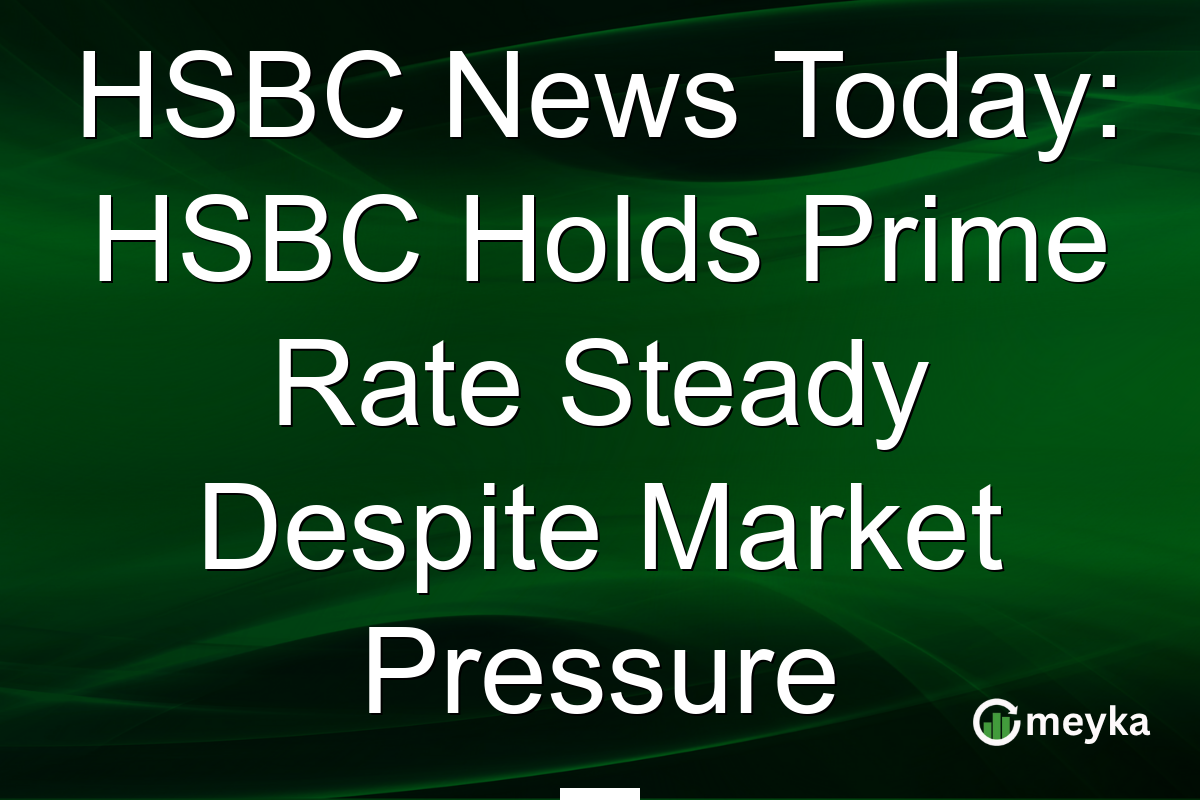HSBC News Today: HSBC Holds Prime Rate Steady Despite Market Pressure
Today, HSBC made waves by announcing that it will hold its prime rate steady in Hong Kong, defying market expectations. As lending rates across the globe see fluctuations, HSBC’s decision showcases its strategic stance on Hong Kong’s economic environment. The move directly impacts mortgage borrowers and business lending, signaling the bank’s confidence in the region’s stability despite growing funding costs.
HSBC’s Strategic Move
Despite rising global lending rates, HSBC has opted to keep its prime rate unchanged in Hong Kong. This decision reflects strong confidence in the local economy despite pressures that typically urge banks to adjust rates. Holding the rate steady is beneficial for borrowers, providing stability in mortgage and business loan payments. By not shifting, HSBC is likely signaling its faith in the Hong Kong financial ecosystem’s resilience against external economic pressures. For more information, read on Bloomberg: HSBC’s Prime Rate Decision.
Implications for Mortgage and Business Lending
Keeping the prime rate steady means mortgage borrowers continue to enjoy existing payment structures without abrupt hikes. This is a relief for many, given that interest rate increases translate to increased monthly payments. Businesses also benefit as stable lending rates allow for predictable financial planning and budgeting. The strategic decision by HSBC reinforces its role as a stable financial entity in Hong Kong, offering a buffer to local enterprises against global interest rate volatility.
HSBC’s Market Position and Performance
HSBC’s stock 0005.HK is currently priced at HK$106.8, slightly up with a day’s change of 0.19%. The decision to maintain steady rates may bolster investor sentiment, reflecting confidence in Hong Kong’s prospects. HSBC’s market cap stands robust at HKD 1.85 trillion, with strong earnings per share of 7.86. Analysts are watching closely for any upcoming shifts due to this rate hold strategy. With the next earnings announcement due on October 28, investors remain optimistic about potential revelations and further strategic decisions.
Broader Economic Impact
HSBC’s decision indirectly highlights the bank’s outlook on Hong Kong’s future amidst evolving global financial pressures. By resisting market pressure to increase rates, HSBC may be signaling stability within Hong Kong’s economy. This decision can potentially maintain consumer confidence and promote continued spending, crucial for local economic health. Analysts and stakeholders are now assessing the broader implications and how this stance might influence future monetary policies in the region.
Final Thoughts
HSBC’s decision to hold its prime rate steady in Hong Kong, despite global market pressures, is a bold move that reflects its confidence in the region’s economic stability. For investors, this indicates the bank’s strategy to support local borrowers and businesses amidst uncertain economic times. With stock prices seeing slight improvements and no immediate rate changes, HSBC continues to stand firm in its position as a leading bank in Hong Kong. For continuous updates, platforms like Meyka offer real-time financial insights and predictive analytics to guide your investment decisions efficiently.
FAQs
The prime rate is the interest rate that banks charge their most creditworthy customers. It’s crucial as it affects the interest rates on various loans, including mortgages, credit cards, and business loans. Keeping it steady provides financial stability and predictability for borrowers.
By holding its prime rate steady, HSBC ensures that current mortgage rates remain unchanged, which means borrowers won’t face immediate increases in their monthly payments, offering them financial relief and stability.
HSBC’s decision suggests a stable outlook on Hong Kong’s economic future despite global pressures. It reinforces consumer and investor confidence, essential for maintaining economic growth and stability in the region.
While it provides short-term stability, holding the rate steady against market pressures could lead to future inflationary risks or economic imbalances if not adjusted appropriately over time.
Disclaimer:
This is for information only, not financial advice. Always do your research.






